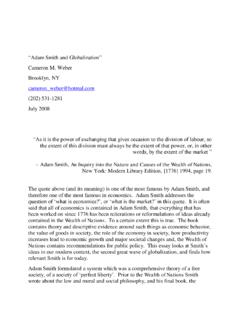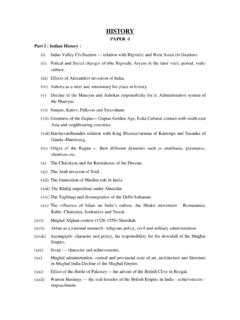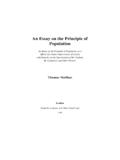Transcription of THE PROSPEROUS COMMU NITY Social Capital …
1 THE PROSPEROUS COMMUNITY Social Capital and Public Life By Robert D. Putnam This article is reprinted fromThe American Prospect Your corn is ripe today mine will be so tomorrow. Tis profitable for us both,that I should labour with you today, and that you should aid me tomorrow. I have no kindness for you, and know you have as little for me. I will not, therefore, take any pains upon your account and should I labour with you upon my own account, in expectation of a return, I know I should be disappointed, and that I should in vain depend upon your gratitude. Here then I leave you to labour alone You treat me in the same manner. The seasons change and both of us lose our harvests for want of mutual confidence and security.
2 David Hume he predicament of the farmers in Hume s parable is all too familiar in communities and nations around the world: Parents in communities everywhere want better educational opportunities for their children, but collaborative efforts to improve public schools falter. Residents of American ghettos share an interest in safer streets, but collective action to control crime fails. Poor farmers in the Third World need more effective irrigation and marketing schemes, but cooperation to these ends proves fragile. Global warming threatens livelihoods from Manhattan to Mauritius, but joint action to forestall this shared risk founders. Failure to cooperate for mutual benefit does not necessarily signal ignorance or irrationality or even malevolence, as philosophers since Hobbes have under scored.
3 Hume s farmers were not dumb, or crazy, or evil they were trapped. Social scientists have lately analyzed this fundamental predicament in a variety of guises: the tragedy ofthe commons the logic of collective action public goods the prisoners dilemma. In all these situations, as in Hume s rustic anecdote, everyone would be better off if everyone could cooperate. In the absence of coordination and credible mutual commitment, however, everyone defects, ruefully but rationally, confirming one another s melancholy expectations. How can such dilemmas of collective action be overcome, short of creating some Hobbesian Leviathan? Social scientists in several disciplines have recently suggested a novel diagnosis of this problem, a diagnosis resting on the concept of Social Capital .
4 By analogy with notions of physical Capital and human Capital tools and training that enhance individual productivity Social Capital refers to T2 features of Social organization, such as networks, norms, and trust, that facilitate coordination and cooperation for mutual benefit. Social Capital enhances the benefits of investment in physical and human Capital . Working together is easier in a community blessed with a substantial stock of Social Capital . This insight turns out to have powerful practical implications for many issues on the American national agenda for how we might overcome the poverty and violence of South Central Los Angeles, or revitalize industry in the Rust Belt, or nurture the fledgling democracies of the former Soviet empire and the erstwhile Third World.
5 Before spelling out these implications, however, let me illustrate the importance of Social Capital by recounting an investigation that several colleagues and I have conducted over the last two decades on the seemingly arcane subject of regional government in Italy. LESSONS FROM AN ITALIAN EXPERIMENT Beginning in 1970, Italians established a nationwide set of potentially powerful regional governments. These 20 new institutions were virtually identical in form, but the Social , economic, political, and cultural contexts in which they were implanted differed dramatically, ranging from the preindustrial to the post industrial, from the devoutly Catholic to the ardently Communist, from the inertly feudal to the frenetically modern.
6 Just as a botanist might investigate plant development by measuring the growth of genetically identical seeds sown in different plots, we sought to understand government performance by studying how these new institutions evolved in their diverse settings. As we expected, some of the new governments proved to be dismal failures inefficient, lethargic, and corrupt. Others have been remarkably successful, however, creating innovative day care programs and job training centers, promoting investment and economic development, pioneering environmental standards and family clinics managing the public s business efficiently and satisfying their constituents. What could account for these stark differences in quality of government?
7 Some seemingly obvious answers turned out to be irrelevant. Government organization is too similar from region to region for that to explain the contrasts in performance. Party politics or ideology makes little difference. Affluence and prosperity have no direct effect. Social stability or political harmony or population movements are not the key. None of these factors is correlated with good government as we had anticipated. Instead, the best predictor is one that Alexis de Tocqueville might have expected. Strong traditions of civic engagement voter turnout, newspaper readership, membership in choral societies and literary circles, Lions Clubs, and soccer clubs are the hallmarks of3 a successful region.
8 Some regions of Italy, such as Emilia Romagna and Tuscany, have many active community organizations. Citizens in these regions are engaged by public issues, not by patronage. They trust one another to act fairly and obey the law. Leaders in these communities are relatively honest and committed to equality. Social and political networks are organized horizontally, not hierarchically. These civic communities value solidarity, civic participation, and integrity. And here democracy works. At the other pole are uncivic regions, like Calabria and Sicily, aptly character ized by the French termincivisme. The very concept of citizenship is stunted there. Engagement in Social and cultural associations is meager.
9 From the point of view of the inhabitants, public affairs is somebody else s business i notabili, the bosses, the politicians but not theirs. Laws, almost everyone agrees, are made to be broken, but fearing others lawlessness, everyone demands sterner discipline. Trapped in these interlocking vicious circles, nearly everyone feels powerless, exploited, and unhappy. It is hardly surprising that representative government here is less effective than in more civic communities. The historical roots of the civic community are astonishingly deep. Enduring traditions of civic involvement and Social solidarity can be traced back nearly a millennium to the eleventh century, when communal republics were established in places like Florence, Bologna, and Genoa, exactly the communities that today enjoy civic engagement and successful government.
10 At the core of this civic heritage are rich networks of organized reciprocity and civic solidarity guilds, religious fraternities, and tower societies for self defense in the medieval communes cooperatives, mutual aid societies, neighborhood associations, and choral societies in the twentieth century. These communities did not become civic simply because they were rich. The historical record strongly suggests precisely the opposite: They have become rich because they were civic. The Social Capital embodied in norms and networks of civic engagement seems to be a precondition for economic development, as well as for effective government. Development economists take note: Civics matters.






